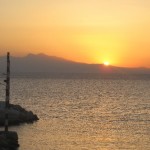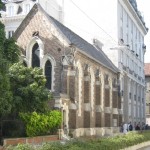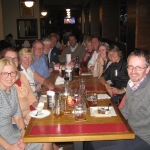
Between Thursday 22nd – Monday 26th September, I attended my ninth and final meeting of the Eastern Archdeaconry Synod which this year, was hosted by the Warsaw Chaplaincy. My first Eastern Archdeaconry Synod was in mid September 2008, held in Corfu, in the week before Sybille and I moved to Prague and before I commenced writing this blog. Subsequent Synod meetings were in Izmir in 2009, Vienna in 2010, Bucharest in 2011, Attica, Athens in 2012, Woking 🙂 in 2013, Prague in 2014 and Zagreb in 2015.
Our Synod meeting took place in Dobre Miejsce, a Roman Catholic Conference Centre located in delightful woodland on the north-western outskirts of Warsaw. It proved to be an excellent venue with comfortable single rooms, a well equipped conference meeting room and a large chapel for worship. The only downsides were the food, which was quite repetitive and very traditionally Polish, and a wifi network which frequently disconnected 🙁
In order to get to Warsaw, I chose to drive, accompanied by Churchwarden Gordon Truefitt, one of our two lay delegates to the Synod. Jack Noonan, the other lay delegate, was also going to travel with us but eventually chose to fly, (at his own expense), as he needed to leave Prague later on Thursday 22nd and return on Sunday evening, rather than on Monday 26th. It is an indication of the vast size of our Eastern Archdeaconry in that the Prague Anglican Chaplaincy is the nearest one to Warsaw, yet my journey was one of almost 700 kilometres.
During the Synod, we enjoyed three Bible studies led by Rev’d Neil Richardson, a Methodist theologian and Biblical scholar. He explored the ministry and writings of St. Paul and how they can be applied in the life of our Chaplaincies.
A good part of our time on Friday, was taken up addressing the issue of ‘Safeguarding’ and how we are to implement the instructions with regard to this subject, coming down to us from the Church of England centrally and the House of Bishops. We had two long sessions, led by the Diocesan Safeguarding Manager, Ian Carter, a former police officer. The training clergy and volunteer leaders are going to have to undertake, seems incredibly onerous. It is the quickest way to put off people volunteering to help in our Chaplaincies!
However, the need to do this was brought home to me in part of the address to Synod the following day, by our Diocesan Bishop, Rt Rev’d Dr Robert Innes. Here are two paragraphs from that address, which clearly highlight the problem.
‘In recent decades it has become apparent that the Church in Europe has not cared as it should have done for children and vulnerable people. As a direct result, in some countries, trust in the church has plummeted. In Belgium, (where Bishop Robert is based), a recent survey by our leading consumer magazine, showed that the RC church is one of the least trusted institutions in our country – trusted far less than the army, the social services, even politicians. I found that deeply shocking.
So our emphasis on safeguarding is about building a high trust culture. It means establishing systems and procedures that, as far as we can, give people confidence that those of our people who are in positions of trust are genuinely trustworthy.’
Late on Saturday afternoon, we had a session on growing new congregations. We heard about some exciting developments in Poland with new Polish-speaking and English-speaking congregations being established in Kraków and with plans for a new congregation in Gdansk. I was asked to speak about how the Brno congregation came into being, here in the Czech Republic.
As always, the time spent informally with colleagues over meals and evening drinks at the bar, were some of the most valuable parts of our Synod in Warsaw. Working as we all do in isolated situations, it is difficult to put into words the importance of this time spent together, once a year.
The Synod ended with a Sunday Eucharist at which Bishop Robert was the celebrant and preacher. For this service, we were joined by the Warsaw Chaplaincy congregation. Immediately afterwards, the Synod members posed for the photograph at the beginning of this post, though a couple of Chaplains are missing from the picture.
I should end this post by expressing my thanks to Rev’d David Brown, the Chaplain in Warsaw, and to his Churchwarden Patrick Acheson, who together did a marvellous job, organising the Synod. Having hosted the Synod in Prague in 2014, I know the amount of work and stress that is involved! Thanks are also due to Archdeacon Colin Williams, for whom it was his first experience of being in overall charge of the Eastern Archdeaconry Synod, having officially come into post at last year’s Synod meeting in Zagreb.




This was wonderful news! Those are the kind of meetings that really takes things seriously. We very seldom have annual synods of that kind. Mostly we meet for a day, listening to some persons with good thinking and experiences. As for the last years passed, we’ve had little or no time for discussions and sharing. We are about 400 ministers in our diocese, so it isn’t easy.
What a lovely picture that is, and a lovely bunch of people. We don’t have any archdeacons. What is their responsibility?
And what function does all these people on the picture have? Volunteers too?
And how nice to hear about the Polish congregations!!! Thank you Ricky, for this report from your horizon!!!
We have a residential synod once a year, mainly because distances are so great. Our Diocese in Europe is divided into seven Archdeaconries and the Prague & Brno congregations are part of the Eastern Archdeaconry, which is Poland, Czech Republic & Austria eastwards, stretching down to include the former Yugoslavia, Greece & Turkey.
In England, Archdeacons have a particular role in guiding congregations about the care, upkeep & repair of Church buildings. But as so many of our congregations in continental Europe, do not own the buildings in which they worship, they fulfil a more pastoral role on behalf of the bishop.
The people in the picture are nearly all of the members of the Eastern Archdeaconry Synod, together with a few spouses who came along to support their other halves, including the wife of the bishop who is standing on his left. All licensed clergy are expected to attend along with elected lay representatives, the number of which is determined by the size of their congregation’s ‘Electoral Roll’ or membership. The members do vote on certain matters. This year we voted to set up an Archdeaconry Fund to cover the cost of certain things. We also voted on where to hold next year’s Synod meeting.
If praise is raised for the organisation of this Synod, we should include Randy Mott of the Warsaw congregation, who I believe was responsible for facilitating many of the primary building blocks which allowed the synod to flow in such a relaxed and friendly way.
Indeed Gordon. I think Randy was involved more in the initial planning, after David Brown volunteered Warsaw as the 2016 hosts at the the 2014 Prague Synod. I remember him writing to me for advice, soon after the conclusion of the 2014 Synod in Prague.
Synods and clergy conferences were always a very enjoyable and helpful part of my active ministry in the past, so I can well appreciate how valuable they have been to you in the very isolated role of chaplain, Ricky. The sense of being part of something bigger than a single chaplaincy or benefice and the sheer pleasure of being able to share experiences and talk shop with colleagues we see so infrequently can really recharge our batteries and support us in our ongoing work. I’m glad your final Archdeaconry Synod was so worthwhile.
I concur entirely with your sentiments, Perpetua. And I shall miss not attending Archdeaconry Synod in 2017, not least because they will be meeting in Crete!